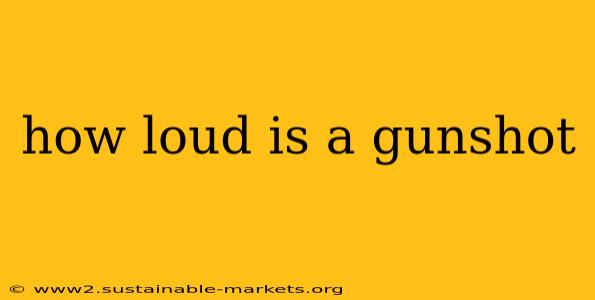The loudness of a gunshot is a complex question, with the answer varying significantly depending on several factors. It's not simply a single decibel (dB) level, but a range, and the potential for hearing damage is substantial. This article will delve into the specifics, exploring the science behind the noise, the dangers of exposure, and what you can do to protect your hearing.
Decibel Levels of Gunshots: A Wide Range
There's no single answer to "how loud is a gunshot?" The sound level can range from 140 to 190 dB, easily exceeding the threshold for immediate hearing damage. To put this in perspective:
- 140 dB: Similar to a jet engine at takeoff. Prolonged exposure at this level will cause permanent hearing loss.
- 160 dB: Comparable to a rocket launching. Even brief exposure can cause permanent hearing damage.
- 190 dB: Approximates the sound of a nearby explosion. This level is incredibly dangerous and can cause immediate and severe hearing loss, even with hearing protection.
Several factors influence the precise decibel level:
- Type of firearm: Larger caliber weapons generally produce louder sounds than smaller ones. A .22 caliber pistol will be significantly quieter than a .50 caliber rifle.
- Ammunition type: The type of ammunition used, including the powder charge and bullet weight, significantly affects the loudness.
- Suppressor use: A suppressor (silencer) can reduce the sound level by a considerable margin, but it won't eliminate it entirely. Even with a suppressor, the sound can still reach dangerous levels.
- Environment: The environment in which the gunshot occurs plays a role. Open spaces allow sound waves to disperse more, while enclosed spaces create echoes and amplify the sound.
The Dangers of Gunshot Noise: Beyond Hearing Loss
The immediate risk associated with gunshots is, of course, hearing damage. This can range from temporary tinnitus (ringing in the ears) to permanent hearing loss, and even noise-induced hearing loss (NIHL). NIHL is a progressive condition that worsens over time, often leading to difficulty understanding speech, particularly in noisy environments.
Beyond hearing loss, exposure to extremely loud sounds like gunshots can also have other detrimental effects:
- Stress and anxiety: The sudden, intense noise can trigger a stress response, leading to elevated heart rate, blood pressure, and anxiety.
- Psychological trauma: For individuals involved in shooting incidents or those exposed to frequent gunfire, the experience can lead to post-traumatic stress disorder (PTSD).
Protecting Yourself from Gunshot Noise: Essential Safety Measures
If you're around firearms, protecting your hearing is crucial. Here are some essential steps:
- Wear hearing protection: This is the single most important step. Use high-quality hearing protection rated for high-decibel levels, such as electronic muffs or custom-molded earplugs.
- Maintain a safe distance: The further away you are from the source of the gunshot, the lower the sound level will be.
- Use a suppressor (when appropriate and legal): Suppressors can significantly reduce the sound level, enhancing safety for both the shooter and those nearby.
Conclusion: A Serious Issue Requiring Awareness
The loudness of a gunshot is a significant safety concern. Understanding the potential for hearing damage and other health problems is crucial for anyone who handles or is around firearms. Always prioritize hearing protection and take necessary precautions to minimize your exposure to loud noise. Your hearing is invaluable – protect it.

